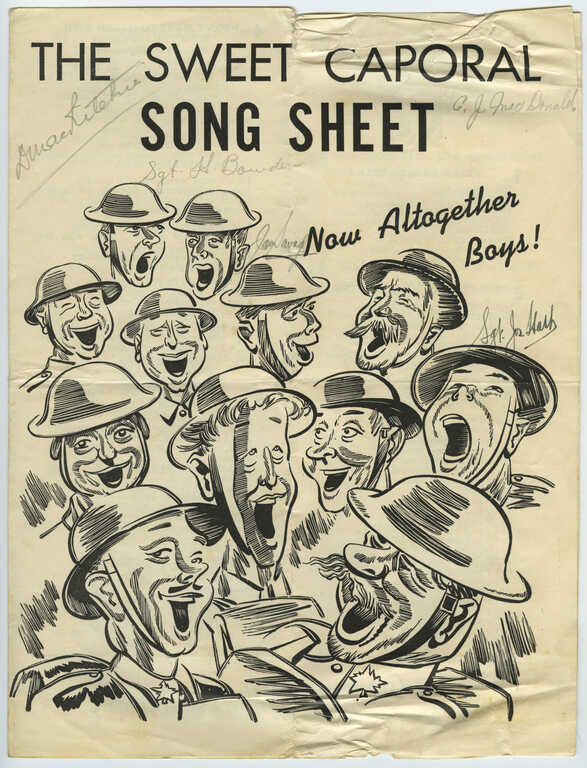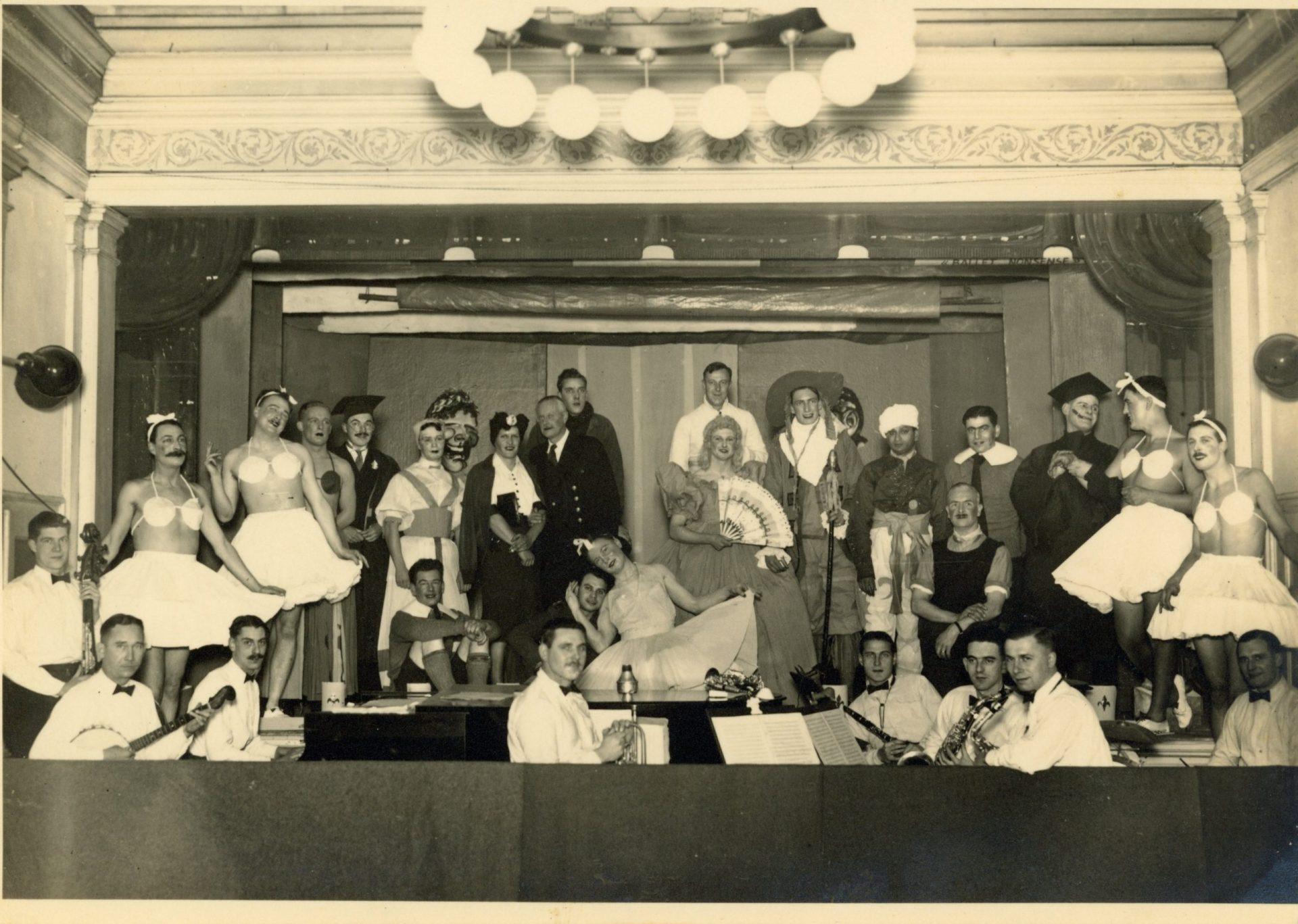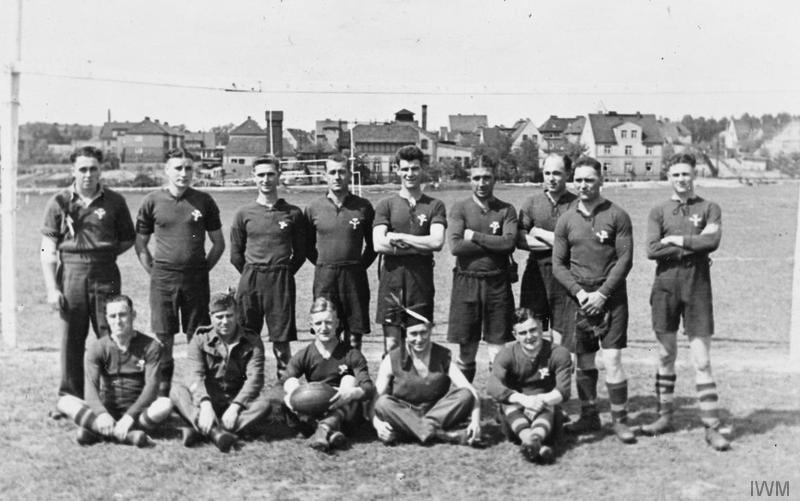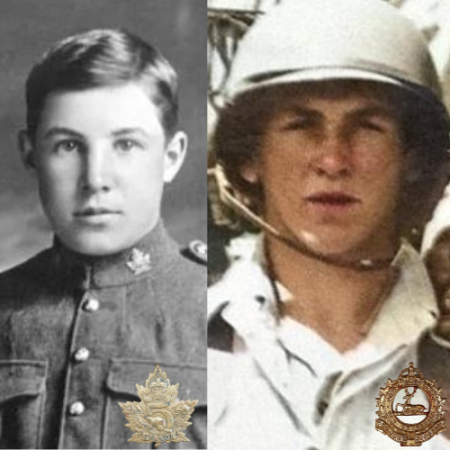To learn more about the Dieppe Raid, visit Courage in Chaos, a virtual exhibit by Je Me Souviens.
After the Dieppe raid, the Germans captured over one thousand Allied soldiers. To get them to the POW camps, the Germans crammed the troops into cattle cars to travel long distances, without stopping or giving them food or water. Already exhausted from the raid, many soldiers did not survive these trips. The terrible conditions they endured on their journey did not really improve once they got to the camps. The Germans gave little food to the prisoners, who were crowded into small rooms for long years. Many Canadian prisoners spent seemingly endless months with their hands chained to keep them from moving around.
To tolerate their situation, the prisoners turned to various forms of entertainment. With few ways to amuse themselves, they came up with imaginative and resourceful strategies to make the days more bearable.
Performances
Performances were a common way for troops at the camps to entertain themselves. In both Asia and Europe, groups of prisoners would put together musical or theatre groups. To start a band, they would procure instruments by trading their rations with people outside the camps (guards or civilians living nearby). However, the prisoners often had to create their own makeshift instruments from whatever they could find. This is also how they made a range of costumes, as prisoners with plenty of time on their hands would combine what they found around the camp with what they traded with the outside.
The German authorities at all camps generally tolerated these performances. As long as they did not directly disrupt camp activities, there was no particular reason to prohibit them. However, the inmates lived with the constant spectre of the authorities cancelling their events as a consequence for some offence. The shows were important for the troops’ morale, and any cancellation was a terrible punishment.
Sports
Since the camps were usually very large, the men would often spend their time playing sports. For example, soccer was common for the prisoners since the only equipment needed is a ball, making it one of the easiest sports to play. Another advantage was that, as a team sport, soccer could be played by many people at once. As historian S. P. Mackenzie noted, soccer was so popular among the prisoners at Stalag IV-B in Mühlberg that this camp alone had over 22 teams. Soccer was also extremely important for the British prisoners. A Danish prisoner said how a British doctor he was talking to once interrupted their conversation by saying he had a soccer game in 10 minutes… in the middle of a snowstorm!
Other sports played in the camps included volleyball and cricket. Like soccer, these sports were simple and required only a ball and a large space. The soldiers also turned to lesser-known sports. For example, at Oflag IV-C at Colditz Castle, they played “stoolball,” a game similar to cricket in which a player on one team bowls a ball to hit the opposing team’s “stool” (a kind of post), which is defended by a player with a bat.
These sports could be hard on the prisoners’ fragile health. What made matters worse was that these trained soldiers, who probably would have preferred to put their energy to other uses, often got very intense during the matches! The camp doctors had to set rules to limit fatigue or the risk of injury. At some camps, rugby matches were limited to 12 minutes and soccer to 30 minutes.
Games, gambling and pranks
For many other prisoners, games were another way to pass the time. Many prisoners had decks of cards, marbles or other small games on them when they were captured. While these games helped the days go by, they often came at a price, as the prisoners would gamble to add some excitement to their days. They would bet money, cigarettes, food or goods from the Red Cross, and they didn’t always bet on games. To alleviate their boredom, they would bet on anything if the participants were willing: whether they could run around the camp within a certain time, how many guards would be on patrol and, of course, which soccer team would win!
Historian S. P. Mackenzie also mentions how practical jokes were another popular pastime at the camps. Often at the expense of the guards, these acts of defiance were an effective way for the imprisoned soldiers to have fun. The pranks against the guards could be brilliant in how both elaborate and simple they could be. For example, soldiers would dig holes and pretend to hide something important and then enjoy watching the German guards spend an entire afternoon searching for the worthless object. They did anything they could to get reactions from the guards: pretending to be stupid and that they could not understand very simple orders; playing imaginary games as a group to make the guards think they had gone crazy; and changing places during roll call to confuse the actual prisoner count.

Entertainment as survival
It is an understatement to say that the imprisoned Canadians had a lot of free time in the German camps. Performances, sports, and games helped them pass the long days at the camp and made the unbearable a little more bearable. These forms of entertainment helped them channel their emotions to cope with not only the anxiety of being away from their loved ones but also the pitiful conditions of the camps and their general frustration at being held prisoner.
Cover photo: A count of prisoners at the Oflag IV-C camp (source: Wiki Commons).
Article originally written by Julien Lehoux for Je Me Souviens. Translated by Amy Butcher (traductionsamyb.ca).
Sources:
- “The Canadian Armed Forces: Canadian Prisoners of the Axis Powers“, Musée canadien de la guerre/Canadian War Museum.
- “Canadian Prisoners of War“, L’encyclopédie canadienne/The Canadian Encyclopedia.
- “Prisoners of War in the Second World War“, Gouvernement du Canada/Government of Canada.
The writing of this article was greatly inspired by the work of historian S. P. Mackenzie and his book The Colditz Myth: British and Commonwealth Prisoners of War in Germany (2004). We recommend you read it!
Many people have written about their experiences in the German POW camps. Whether from the point of view of the prisoners or the guards, these testimonies are important sources for reconstructing the daily life of the camps. We offer you some of these testimonies, centered around the castle of Colditz, which are available online:
- Jerry E. R. Wood, Detour, the story of Oflag IVC (1946).
- Reinhold Eggers, Colditz: the German side of the story (1961).
- E. H. Larive, The man who came in from Colditz (1975).
For an original online source, we recommend consulting the diary of Private Norman Routledge available online.









